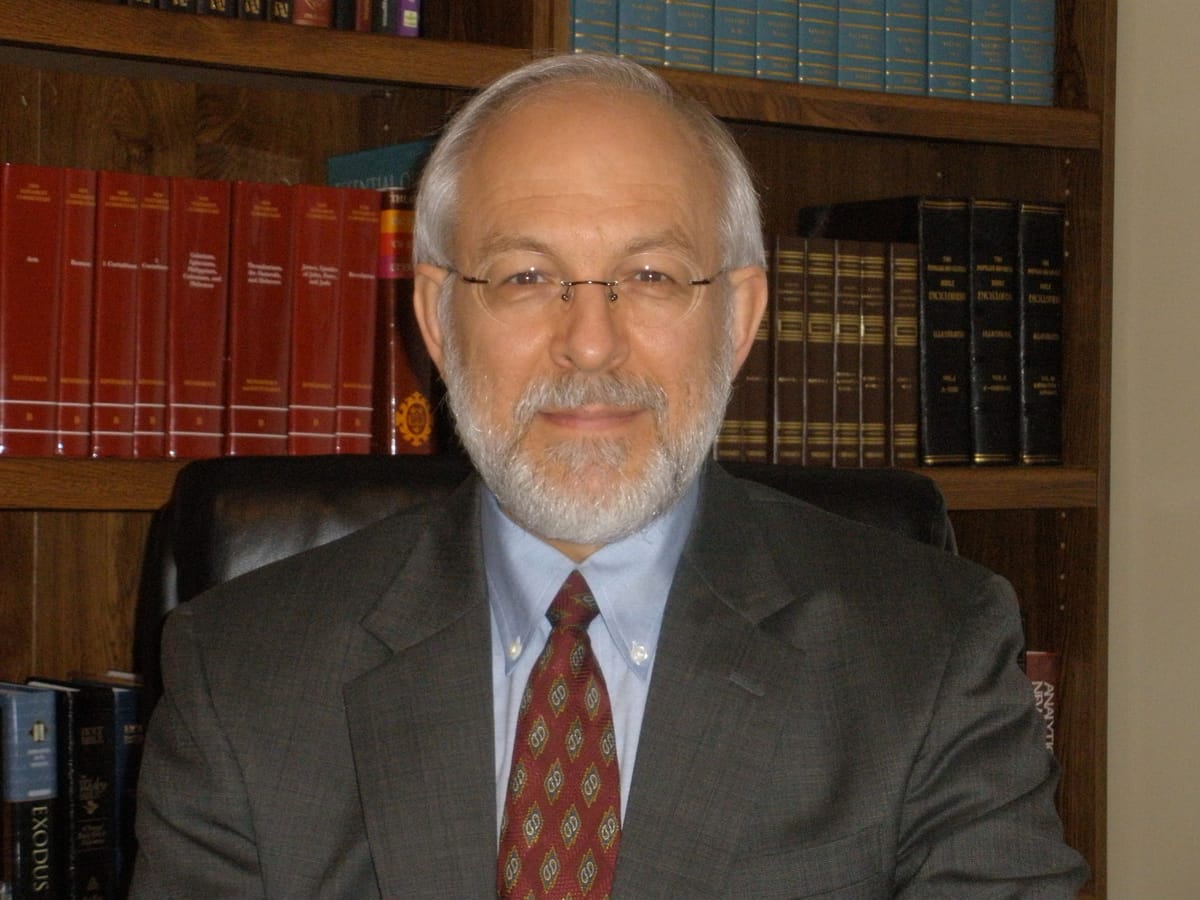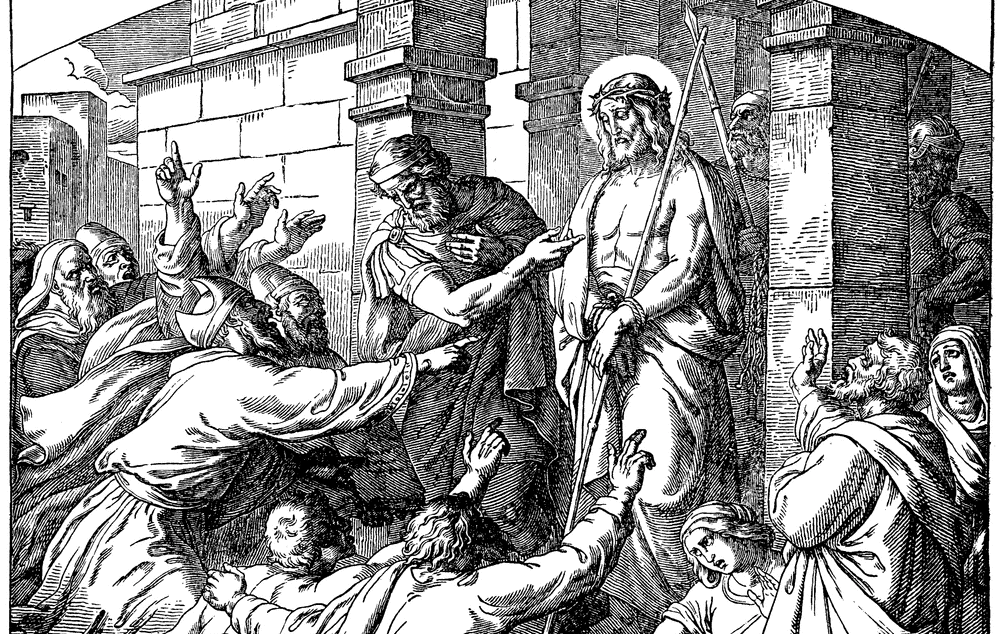Today is Thursday and this installment deals primarily with what happened on the Thursday of Holy Week. Consider it carefully. This is part four of our serialization of Dr. Howard Rand’s treatise on the titular topic.
Since Dr. Rand has used boldface type to set apart Scripture verses, we use only underlining and italics for our emphasis—unless otherwise noted. All comments in [brackets] are ours. For legibility, we have also divided large paragraphs into smaller ones. QUOTE:
When the morning was come, Jesus was taken from the Palace of the High Priest to the Hall of the Sanhedrin where the question was again put to Him if He was the Christ, and Jesus again affirmed that He was — after which He was bound and led away to Pontius Pilate.
Judas, who betrayed Him, evidently had not foreseen what would follow that betrayal, perhaps expecting the Lord to manifest His power and destroy His enemies. Suffering from great remorse, he brought back the thirty pieces of silver to the chief Priests and Elders, saying:
"I have sinned in that I have betrayed the innocent blood. And they said, What is that to us? See thou to that. And he cast down the pieces of silver in the temple, and departed, and went and hanged himself" (Matt. 27: 4-5.)
The Chief Priest took the silver and, because it was not lawful to put the price of blood into the treasury, it was used to purchase the potter's field in which to bury strangers.
Returning to the trial, Jesus was taken before Pilate but the Jews did not enter the Hall:
"Then led they Jesus from Caiaphas unto the hall of judgment: and it was early; and they themselves went not into the judgment hall, lest they should be defiled; but that they might eat the passover." (John 18: 28.)
Here is further confirmation that the Passover had not yet been eaten and so Jesus did not partake of the actual Passover Feast with His disciples.
Pilate asked what it was that Jesus was accused of doing, telling the Jews to take Him and judge Him according to their own laws. The Jews replied that it was not lawful for them to put Him to death, fulfilling the saying of Jesus that He would be crucified. The Jews then accused Jesus before Pilate of perverting the nation, forbidding to give tribute to Caesar and declaring He was the Christ or anointed King.
Pilate then called Jesus and asked Him if He was the King of the Jews. Jesus wanted to know if he asked for himself, or had been told by others. Pilate answered by saying, "Am I a Jew?" He then said that His own nation and the Chief Priests had delivered Him up to be judged by him and Pilate wanted to know what He had done. Jesus then said:
"My kingdom is not of this world: if my kingdom were of this world, then would my servants fight, that I should not be delivered to the Jews: but now is my kingdom not from hence. Pilate therefore said unto him, Art thou a king then?
Jesus answered, Thou sayest that I am a king. To this end was I born, and for this cause came I into the world, that I should bear witness unto the truth. Every one that is of the truth heareth my voice." (John 18: 36-37.)
Pilate asked Jesus, "What is truth?" Then he went out to the Jews and told them he found no fault in Him.
The statement made by Jesus regarding His Kingdom not being of this world has led men to assume it has no earthly existence. They fail to fully recognize all that Jesus is saying here. He declared His Kingdom is not of this Cosmos; i.e., of this world order founded upon violence and the sword, else His followers would fight.
His Kingdom is established in peace under the justice and equity of the administration of the Law of the Lord. [Note: “equity” means righteousness; not equal economic outcomes for all people, as the Leftist liars now proclaim.]
The Jews accused Jesus of many things, but He answered them not a word. And when the Jews informed Pilate that Jesus was from Galilee and thus a Galilean, Pilate knew He belonged under Herod's jurisdiction and so he sent Him to Herod who was also in Jerusalem at this time.
Herod had desired for a long time to see Jesus and so was very glad that He was brought before him. Having heard many things concerning Him, Herod hoped to see some miracles done by Him. Herod questioned Jesus, but He answered him nothing.
Then Herod, with his soldiers, mocked Him and arrayed Him in a gorgeous robe, then sent Him back to Pilate. When Pilate sat down in the judgment seat, his wife sent word to him, saying:
"Have thou nothing to do with that just man: for I have suffered many things this day in a dream because of him." (Matt. 27: 19.)
At the time of the Feast the Governor was accustomed to release some prisoner. There was a robber by the name of Barabbas who had committed murder whom the chief Priests and Elders had persuaded the multitude that they demand be released unto them.
Pilate sought to release Jesus, but the multitude cried, "let him be crucified." When Pilate saw that he could not prevail against the tumult, he took water and washed his hands before the people and said:
"I am innocent of the blood of this just person: see ye to it. Then answered all the people, and said, His blood be on us, and on our children." (Matt. 27: 24-25.)

This self-pronounced curse has followed the Jews wherever they have gone and in whatever country they have resided. As a people and race they will never escape its blight until they acknowledge Him whom they rejected as their Saviour and Messiah.
Pilate, as a result of the demand by the multitude, released Barabbas and when Jesus had been scourged He was delivered up to the will of the people. The soldiers took Him, stripped Him and clothed Him with a purple mantle and put a scarlet robe upon Him.
They placed a crown of thorns on His head and put a reed in His right hand. Then they bowed the knee before Him, worshipped Him mockingly and, saluting Him, said: "Hail King of the Jews."
Again Pilate appeared unto the people and said that he found no fault in Jesus, but as Jesus came forth wearing the crown of thorns the Chief Priests and officers cried, saying, "crucify Him." Then Pilate told them to take Him and crucify Him, for he said he found no fault in Him.
The Jews then said that under their law, because He had claimed to be the Son of God, He should die. When Pilate heard this he was still more afraid and went again into the Judgment hall with Jesus, and said unto Him: "Whence art thou?" But Jesus gave him no answer. Pilate then said:
"Speakest thou not unto me? Knowest thou not that I have power to crucify thee, and have power to release thee?" (John 19: 10.)
Jesus replied:
"Thou couldest have no power at all against me, except it were given thee from above: therefore he that delivered me unto thee hath the greater sin." (John 19: 11.)
Thus Jesus himself pointed to the ones guilty of His death, those who had delivered Him over to Pilate for judgment. And regardless of how much they may seek to disclaim responsibility, not until the Jews repudiate what their forefathers did and recognize Jesus Christ as the son of God, will the blood curse the Jews pronounced upon themselves — accurately verified in the historical fulfillment of centuries of suffering upon this people in accord with the correctness of our Lord's judgment — be lifted.
Pilate continued to seek the release of Jesus but the Jews cried out, "If thou let this man go, thou art not Caesar's friend." Pilate then returned to the judgment seat in the Hall and passed the verdict and Jesus was delivered up to be crucified.
It was Preparation Day when the Paschal Lamb was to be slain, and on this day Jesus was led forth to be crucified. He staggered under the weight of the cross He was compelled to bear. A man from the country, Simon by name, was compelled by the Romans to help Jesus bear the cross. A great multitude followed and many women bewailed Him:
"But Jesus turning unto them said, Daughters of Jerusalem, weep not for me, but weep for yourselves, and for your children. For, behold, the days are coming, in the which they shall say, Blessed are the barren, and the wombs that never bare, and the paps which never gave suck.," (Luke 23: 28-29.)
Two malefactors were led away to be put to death with Him. They came to the place called Golgotha, in Hebrew, which being interpreted is the Place of Skulls and there He was crucified, as were the two malefactors with Him, one on each side.
Thus scripture was fulfilled, for He was numbered with the transgressors. The Jews objected to the title Pilate had written to go over the cross, "This is Jesus of Nazareth, the King of the Jews." But Pilate said, "what I have written I have written."
And it was the third hour when He was crucified. This would be about nine o'clock in the morning. Following the crucifixion the soldiers divided His garments among them as He hung on the cross and cast lots for His vestment. Many people stood by at the cross:
"And they that passed by reviled him, wagging their heads, And saying, Thou that destroyest the temple, and buildest it in three days, save thyself. If thou be the Son of God, come down from the cross." (Matt. 27: 39-40.)
Others said that He trusted in God, so let God now deliver Him if He delights in Him. And the soldiers also mocked Him, saying that if He was the King of the Jews let Him save Himself:
And one of the malefactors which were hanged railed on him, saying, If thou be Christ, save thyself and us. But the other answering rebuked him, saying, Dost not thou fear God, seeing thou art in the same condemnation? And we indeed justly; for we receive the due reward of our deeds: but this man hath done nothing amiss.
And he said unto Jesus, Lord, remember me when thou comest into thy kingdom. And Jesus said unto Him, Verily I say unto thee, Today shalt thou be with me in paradise." (Luke 23: 39-43.)
Here we have an instance where the use of a comma has completely changed the meaning of the statement of our Lord, for Paradise has not yet come. What He actually said should be punctuated to read as follows, "Verily I say unto thee today, shalt thou be with me in paradise." In other words, Jesus was telling him that very day that when Paradise came the thief would be there with Him.
Now there stood by the cross of Jesus His mother, and His mother's sister, Mary the wife of Cleophas, and Mary Magdalene. When Jesus therefore saw His mother, and the disciple whom He loved [John the apostle, writer of this gospel] standing by, He saith unto His mother, "Woman, behold thy son! Then saith he to the disciple, Behold thy mother! And from that hour that disciple took her unto his own home" (John 19: 25-27).
It was about the sixth hour (this was in Hebrew time, reckoning from sunrise to sunset, therefore about noontime) when there came a supernatural darkness over all the land until the ninth hour. This darkness therefore extended from noon until three o'clock in the afternoon.
It was not an eclipse of the sun as it would in that case have been necessary to have a new moon and on Nisan 14th the moon was full. There is no scientific explanation of this three hours of darkness. [Italic emphasis in the original.]
About the ninth hour (3 P.M.) Jesus cried with a loud voice saying, "Eloi, Eloi, lama sabachthani?" Ferrar Fenton translates this, "O My God! My God! To what have You foresaken me?"
Some, standing by, thought He called for Elijah. A sponge was filled with vinegar and put to His lips and when He had received the vinegar He cried with a loud voice, "It is finished." And when Jesus had cried this He said:
"Father, into thy hands I commend my spirit: and having said thus, he gave up the ghost." (Luke 23: 46.)
Some interesting events followed His death. The vail in the Temple was rent in twain from top to bottom. This was an act of God for, had men rent the vail, it would have been torn from bottom to top. Then follows the statement covering events from His death at 3 P.M. on Thursday, Nisan 14th, to His resurrection Sunday morning, Nisan 17th:
"And the earth did quake, and the rocks rent; And the graves were opened; and many bodies of the saints which slept arose, and came out of the graves after his resurrection, and went into the holy city, and appeared unto many." (Matt. 27: 51-53.)
When the centurion and they that were watching Jesus saw the earthquake, and those things that were done, they feared greatly and said, "Truly this was the Son of God."
Because it was the Preparation Day (Nisan 14th), in order that the bodies might not remain upon the cross on the Sabbath, for that particular Sabbath was the Feast Day (Friday, Nisan 15th) and though a day of rest it was not the seventh day of the week, the Jews besought Pilate that their legs might be broken and their bodies taken away.
Pilate granted the request and the soldiers broke the legs of the two thieves but, when they came to Jesus and saw He was dead, they did not break His legs. One of the soldiers with his spear pierced His side and straightway there came out blood and water. This was clear proof that Jesus Christ died of a broken heart.
When it was even, still Preparation Day, but nearing its end, Joseph of Arimathaea (a disciple of Jesus, but secretly — for fear of the Jews [and who was also the great uncle of Jesus, being Mary’s uncle]) went to Pilate and begged the body of Jesus. Pilate could not believe He was dead but, when the centurion informed him that He was, he commanded that the body be delivered to Joseph.
Joseph took the body and there also came Nicodemus, bringing a mixture of myrrh and aloes, in weight about a hundred pounds. They wound the body in linen bands with spices and wrapped Him in clean fine linen. The body was then laid in a new tomb which Joseph had hewn in the rock because it was near and it was Preparation Day. And Joseph rolled a great stone into the entrance of the Sepulchre and departed. END QUOTE
(To be continued.)
END




